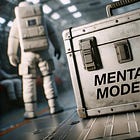Intelligence Compounds Over Time and We Can Improve It
Would you take an intelligence pill if it were available?
A friend asked me why I write. I assumed I knew, but after thinking about it carefully, it struck me that I had no idea.
Do you remember the movie Limitless? The protagonist takes a magic pill and becomes super intelligent, like some sort of god. It appeals to us because we are drawn towards effortless and quick solutions to life's challenges.
But I don’t believe in effortless and quick solutions. Nor do I believe that our intelligence is fixed. I believe that it compounds over time and that we can improve it. Something I was unaware of is that there are two types of intelligence.
Fluid & Crystallised Intelligence
These two types form the foundation of most intelligence tests:
Fluid intelligence is the ability to solve new problems, reason quickly, and detect patterns. In IQ tests, it’s measured using number series, logic puzzles, or pattern recognition tasks.
Crystallised intelligence is the ability to use knowledge we've already acquired through vocabulary, facts, or abstract reasoning. It reflects what we’ve learned from experience.
In short, fluid intelligence is how we think, while crystallised intelligence is how we apply what we’ve learned.
Here is how they approximately change over time (fluid intelligence peaks at around age 271):
How to improve?
Fluid intelligence can be slightly improved, but realistically, our capabilities are limited by genes and other factors such as nutrition during our upbringing2. Unaware of this, during my time at university, I played a lot of brain games (like Lumosity) that were supposed to help with intelligence, but I felt like I was simply getting better at the games themselves (right now, I stick to chess).
You cannot significantly improve your IQ score, but what you can do is focus on your crystallised intelligence, which improves when you acquire new knowledge — like learning new mental models and exploring new perspectives!
Mental Models
I believe that mental models are essential tools for improving how we think, solve problems, and make decisions. They provide structured ways to navigate complexity.
For example, Inversion, where we invert the problem to avoid costly mistakes, or Second-order thinking to focus on long-term consequences, not just immediate ones.
Mental models published on Perspectiveship:
And a curated set in the context of engineering leadership.
Perspectives
Just like mental models, exploring new perspectives is important for clear thinking. Seeing a problem through someone else’s eyes often reveals blind spots in our reasoning.
Our thoughts are shaped by our environment and experiences, all of which can introduce hidden biases. The more we challenge those biases, the better decisions we can make.
Articles focused on “perspectives”.
Summary
I was never the smartest guy in the room, but I always wanted to be.
When I took Gallup’s CliftonStrengths test (a popular psychological test), two of my top traits were Achiever and Learner. So, I was destined to work on getting smarter.
I couldn’t change my genes or how I was raised, but I could use mental models and explore new perspectives.
That’s why I write.
I believe that taking small, article-sized pills of new perspectives can improve how we think, and improve our crystallised intelligence. It has helped me make better decisions — both big and small, in life and work.
I’m glad you’re part of the journey.
— Michał
P.S. Veritasium channel did a great episode about IQ: ”I Took an IQ Test to Find Out What it Actually Measures”





Thanks for the insightful resources, I also try to get a little bit smarter every day, one step at a time
As always, great read, Michal!
On a similar note to the „superintelligence pill”, there’s an awesome short story from the one and only Ted Chiang titled „Understand”: https://en.wikipedia.org/wiki/Understand_(story)